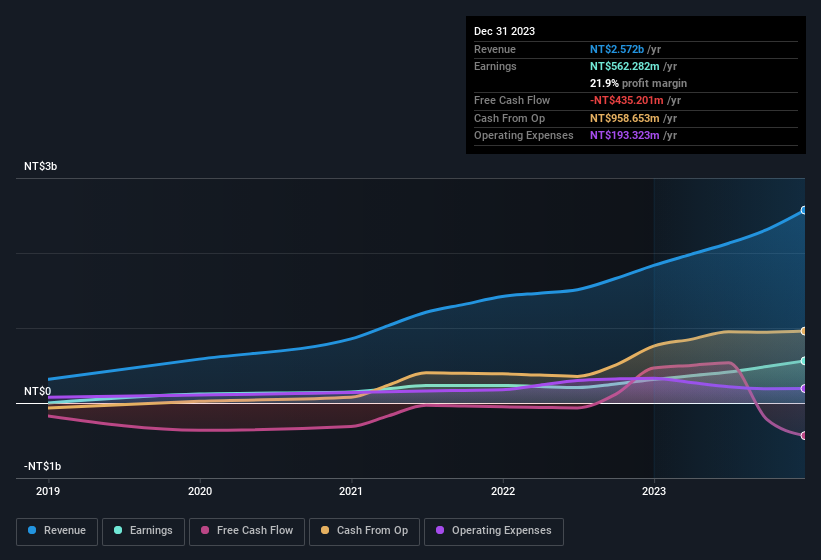- Taiwan
- /
- Medical Equipment
- /
- TWSE:4771
There May Be Underlying Issues With The Quality Of Vizionfocus' (TWSE:4771) Earnings

Vizionfocus Inc.'s (TWSE:4771) stock was strong after they recently reported robust earnings. However, we think that shareholders may be missing some concerning details in the numbers.
View our latest analysis for Vizionfocus

A Closer Look At Vizionfocus' Earnings
One key financial ratio used to measure how well a company converts its profit to free cash flow (FCF) is the accrual ratio. The accrual ratio subtracts the FCF from the profit for a given period, and divides the result by the average operating assets of the company over that time. The ratio shows us how much a company's profit exceeds its FCF.
That means a negative accrual ratio is a good thing, because it shows that the company is bringing in more free cash flow than its profit would suggest. While it's not a problem to have a positive accrual ratio, indicating a certain level of non-cash profits, a high accrual ratio is arguably a bad thing, because it indicates paper profits are not matched by cash flow. To quote a 2014 paper by Lewellen and Resutek, "firms with higher accruals tend to be less profitable in the future".
For the year to December 2023, Vizionfocus had an accrual ratio of 0.45. As a general rule, that bodes poorly for future profitability. And indeed, during the period the company didn't produce any free cash flow whatsoever. Even though it reported a profit of NT$562.3m, a look at free cash flow indicates it actually burnt through NT$435m in the last year. It's worth noting that Vizionfocus generated positive FCF of NT$466m a year ago, so at least they've done it in the past. The good news for shareholders is that Vizionfocus' accrual ratio was much better last year, so this year's poor reading might simply be a case of a short term mismatch between profit and FCF. Shareholders should look for improved cashflow relative to profit in the current year, if that is indeed the case.
That might leave you wondering what analysts are forecasting in terms of future profitability. Luckily, you can click here to see an interactive graph depicting future profitability, based on their estimates.
Our Take On Vizionfocus' Profit Performance
As we have made quite clear, we're a bit worried that Vizionfocus didn't back up the last year's profit with free cashflow. As a result, we think it may well be the case that Vizionfocus' underlying earnings power is lower than its statutory profit. But the good news is that its EPS growth over the last three years has been very impressive. Of course, we've only just scratched the surface when it comes to analysing its earnings; one could also consider margins, forecast growth, and return on investment, among other factors. So while earnings quality is important, it's equally important to consider the risks facing Vizionfocus at this point in time. While conducting our analysis, we found that Vizionfocus has 1 warning sign and it would be unwise to ignore this.
This note has only looked at a single factor that sheds light on the nature of Vizionfocus' profit. But there is always more to discover if you are capable of focussing your mind on minutiae. Some people consider a high return on equity to be a good sign of a quality business. While it might take a little research on your behalf, you may find this free collection of companies boasting high return on equity, or this list of stocks that insiders are buying to be useful.
If you're looking to trade Vizionfocus, open an account with the lowest-cost platform trusted by professionals, Interactive Brokers.
With clients in over 200 countries and territories, and access to 160 markets, IBKR lets you trade stocks, options, futures, forex, bonds and funds from a single integrated account.
Enjoy no hidden fees, no account minimums, and FX conversion rates as low as 0.03%, far better than what most brokers offer.
Sponsored ContentNew: Manage All Your Stock Portfolios in One Place
We've created the ultimate portfolio companion for stock investors, and it's free.
• Connect an unlimited number of Portfolios and see your total in one currency
• Be alerted to new Warning Signs or Risks via email or mobile
• Track the Fair Value of your stocks
Have feedback on this article? Concerned about the content? Get in touch with us directly. Alternatively, email editorial-team (at) simplywallst.com.
This article by Simply Wall St is general in nature. We provide commentary based on historical data and analyst forecasts only using an unbiased methodology and our articles are not intended to be financial advice. It does not constitute a recommendation to buy or sell any stock, and does not take account of your objectives, or your financial situation. We aim to bring you long-term focused analysis driven by fundamental data. Note that our analysis may not factor in the latest price-sensitive company announcements or qualitative material. Simply Wall St has no position in any stocks mentioned.
About TWSE:4771
Vizionfocus
Engages in the manufacturing of medical equipment in Taiwan, China, Japan, and the United States.
Excellent balance sheet with proven track record.
Market Insights
Community Narratives



